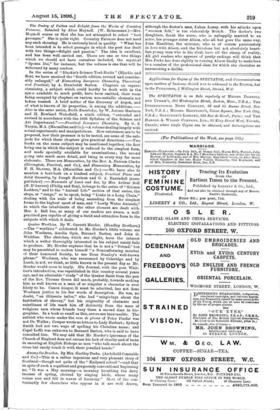In the series of " Blackie's Science Text-Books " (Blackie
and Son), we have received the "fourth edition, revised and consider- ably enlarged," of Elementary Inorganic Chemistry, Theoretical and Practical, by A. Humboldt Sexton. Chapters on organic chemistry, a subject which could hardly be dealt with in the spaue available to much profit, have been omitted, their room being occupied by chapters on various non-metallic elements not before treated. A brief notice of the discovery of Argon, and of what is known of its properties, is among the additions. Also in the same series, Earth-Knowleds, by W. Jerome Harisson and H. Rowland Wakefield, a ninth edition, " extended and revised in accordance with the 1895 Syllabus of the Science and Art Department."—Practical Inorganic Chemistry. By G. S. Turpin, M.A. (Macmillan and Co.).—A volume dealing largely with actual experiments and manipulations. How substances are to be prepared, how their presence is to be tested, are some of the sub- jects for which these chapters give practical directions.—Two books on the same subject may be mentioned together, the first being one in which the subject is reduced to the simplest form, and made specially available for examinations ; the second going into much more detail, and being in every way far more elaborate. These are Mensuration, by the Rev. A. Dawson Clarke (Rivington, Percival, and Co.), and Elementary Mensuration, by F. H. Stevens, M.A. (Macmillan and Co.) —We have also to mention a text-book on a kindred subject, Practical Plane and Bolid Geometry, by Joseph Harrison and G. A. Baxendall (same publisher).— Mammals of Land and Sea, by Mrs. Arthur Bell (N. D'Anvers) (Philip and Son), belongs to the series of "Science Ladders," and to the "Animal Life" section of that series, the steps, or " rungs," so to speak, being " Links in a Long Chain," dealing with the scale of being ascending from the simplest forms to the highest sport of man, and " Lowly Water Animals," in which the inhabitants of the other element are dealt with. Mrs. A. Bell has, as many of our readers are aware, a well- prastised pen capable of giving a lucid and attractive form to the subjects with which it deals.


































 Previous page
Previous page